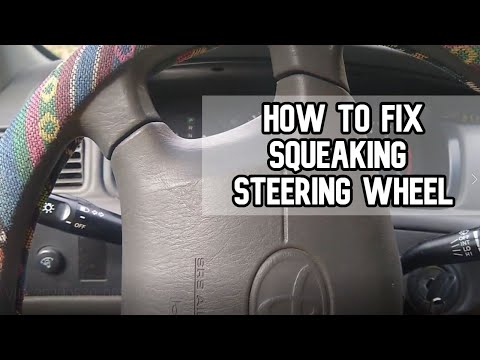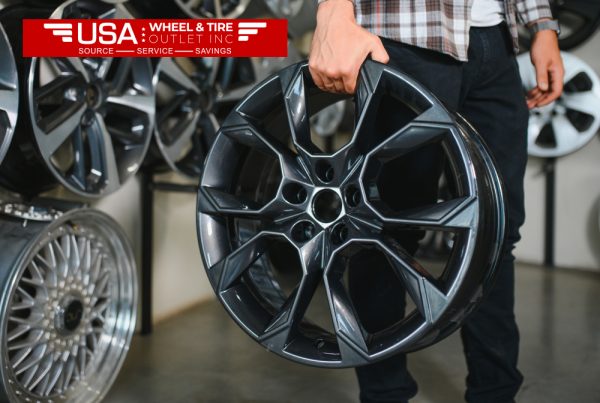A squeaking sound while driving around can be a bit annoying. The sound could indicate minor problems or indicate more important issues that require urgent attention. Identifying the root cause and implementing the correct solutions will ensure that your car is safe and smooth.
Common Causes of Squeaky Wheels
1. Insufficient Wheel Lubrication
Lack of lubrication is one of the main causes of a squeaky wheel. Moving parts such as tie rods, ball joints, and wheel bearings rely on grease to reduce friction. Over time, this grease can wear away or dry out due to exposure to moisture, dirt, and regular use. Without adequate lubrication, metal parts rub against one another, causing the unpleasant squeaking sound, particularly when turning. Regular maintenance, including applying high-quality grease to these components, can resolve this issue. Companies like USA Wheels Tires INC emphasize the importance of proper maintenance to prevent increased wear and damage to the wheel assembly, which could lead to costly repairs.
2. Worn Brake Components
Problems with brakes can also lead to the wheels to squeak. If brake pads are worn down their indicators can produce a loud squeal that is an alert. In the same way, dirt, dust or rust accumulation on calipers or rotors can create noise while a wheel is being moved. In addition, improperly installed or damaged brake components may be a contributing factor to the issue.
3. Damaged Suspension System
Its suspension systems play a vital part in absorbing shocks and keeping the wheel aligned. As time passes, the components such as bushings, control arms, and springs could be worn out, resulting in sounds when turning or driving on uneven surfaces. The noises usually indicate it is the suspension unit that’s in stress. In the absence of them, you could be compromising the stability and handling of the vehicle.
4. Misaligned Wheels
Wheel misalignment can be another reason behind the squeaking. The wheels are not properly placed relative to one another or to the vehicle. This can cause uneven wear of the tires, and also puts extra tension on the suspension as well as steering parts, which can cause noises. Incorrect alignment can result from hitting potholes, curbs, or any other obstacles. A professional alignment of the wheels will fix the issue and improve the handling of the vehicle as well as its overall quality.
5. Dirt and Debris Build-Up
Dust, dirt, and other debris stuck in wheel assemblies and brakes can cause some squeaks. These particles can impede the normal motion of components creating noise and friction. Cleaning the undercarriage and wheels often can reduce the risk of buildup of dirt. If the noise persists, a extensive cleaning performed by an expert might be necessary to make sure the components have no obstructions.
How to Fix Squeaky Wheels When Turning
1. Apply Lubrication
Lubrication is among the most simple and effective solutions to squeaky wheel. Apply a high-quality lubricant on moving parts, such as joints, bushings and hinges which could be the cause of the sound. Utilize grease lubricants or silicone based oils that are made specifically for use in automotive applications. Be sure to wash the area thoroughly prior to applying the lubricant in order to avoid the buildup of dirt and grime. This is not just a way to eliminate noises, but also improves the performance of the car’s components.
2. Inspect and Replace Suspension Components
Damaged or worn suspension parts like bushings or control arms, may cause squeaky sound as you turn. Examine these components for wear cracks, looseness, or cracks. If you notice any damaged parts Replace them immediately with top-quality replacements. The repairs to your suspension could require expert assistance to ensure correct setup and align. Maintaining your suspension system in good working order will result in an easier and quieter ride.
3. Service Wheel Bearings
Wheel bearings that are dry or defective are a frequent cause of the sound of squeaking. Examine the wheel bearings to determine wear or rust, or for the absence of grease. When the wheel bearings appear dry, wash them and restore them to lubrication using the correct grease. In the event that the bearings have worn out or damaged, they need to be replaced to avoid any the occurrence of further problems. Well-maintained wheel bearings decrease the noise they create and reduce friction and improve the overall performance of your vehicle.
4. Check the Drive Belt
A worn or loose drive belt may also result in noisy squeaking sounds during turns. Examine the belt for fraying, cracks or any other signs of improper tension. Adjust the belt’s tension in accordance with the manual for your vehicle and replace the belt if there is signs of wear. A properly maintained drive belt will ensure your power steering unit as well as other parts function smoothly making noise, and improving efficiency.
5. Clean Out Debris
Dirt and gravel as well as other debris could get caught in the brakes or wheel assembly which can cause noises that squeak when you turn. Take the wheels off and examine the area for foreign particles. Remove any debris with an airbrush or compressed. Making sure that wheels are clear of obstructions not only reduces noise, but also shields the parts from wear and tear.
6. Replace Brake Pads
Broken brake pads are the most common cause of squeaky wheel. If your brake pads are worn thin or wear unevenly replace them as soon as possible by using high-quality ones. Wear indicators on brake pads typically make a loud whistling sound that is warning signs. Taking action quickly will not only stop the noise but also improves brake performance.
Following these tips You can successfully eliminate the squeaky wheel when you turning to ensure a smoother and more enjoyable experience.
Preventing Wheel Squeaks
1. Use High-Quality Parts
The investment in quality replacement components significantly reduces the possibility of noisy wheels. High-end brake pads and suspension parts and lubricants are engineered to last longer, making less the noise level and enhancing overall performance. Do not choose cheaper options that wear out rapidly or reduce performance. When replacing components, make sure they’re compatible with the specifications of your vehicle. Quality parts do not just reduce noise, but they also improve security and dependability. Making sure you choose reputable brands and vetted components is an effective way to ensure the quietness and efficiency of your vehicle.
2. Monitor Tire Pressure
Maintaining the right tire pressure is crucial to the prevention of wheel-related problems, such as the squeaks. Inflating or underinflating tires can cause stress on the wheel assembly, which can lead to noise and uneven wear in the course of movement. Utilize a reliable tension gauge for your tires to test your tires on a regular basis and then adjust them to the suggested PSI levels. An appropriate tire pressure will not only stop squeaks, it increases the fuel efficiency and handling. Monitoring the pressure of your tires is a quick and effective method of extending the lifespan of your tires and provide a more comfortable, quiet ride.
If you follow these preventative steps to avoid these preventative measures, you will be able to eliminate the pain of squeaky wheels and have a more enjoyable driving experience.
When to Seek Professional Help
If you’ve tried the fixes and still hear a squeak then seek out an expert mechanic. A persistent sound could signal something more serious that requires professional attention. Troubles related to alignment, suspension wear or internal component damage should be handled by a professional.
Solutions to Fix Squeaky Wheels
1. Inspect and Lubricate Moving Parts
The first step in fixing the squeaky wheel is to inspect and lubricating the moving components. Components like tie rods, ball joints and wheel bearings can become dry after a while, which can lead to noise. Clean these parts to remove any dirt or debris that could exacerbate the issue. Apply a premium automobile grease, or other lubricant in order to lessen friction and guarantee smooth movement. Take care to eliminate any corrosion or rust that is visible that could be causing the sound of squeaks. Regular lubrication does not just stop noise but also increases the lifespan of these vital components. Conducting this maintenance every couple of months will keep your wheels in good shape and in good working order.
2. Replace Worn Brake Pads
The wear and tear of brake pads is the most common cause of noise from wheels, particularly when stopping or turning. If the sound of squeaking is associated with decreased braking efficiency It’s time to inspect the brake pads. Check for signs of wear, like thinner pads, or warning squealers that are made to make sounds as pads wear. The replacement of worn brake pads immediately will eliminate squeaks and guarantee safety when stopping. When replacing the pads, examine the rotors for indications of wear or damage and replace or resurface the pads if required. Always choose high-quality pads for replacement to ensure maximum performance and long-term durability.
3. Check Alignment and Balance
Unbalanced or misaligned wheels may cause squeaks because of uneven wear and increased stress to the suspension. If your vehicle is moving to one side or you experience a rumble while driving, you must get the alignment and balance assessed. A professional alignment will ensure that the wheels are properly positioned while balancing regulates the distribution of weight across each tire. The adjustments do not just stop the squeaks, but also enhance fuel efficiency, handling and tire life. Regular checks for alignment, particularly after hitting curbs or potholes could prevent further noise or performance issues.
4. Examine the Power Steering System
If the sound of squeaking is loudest when turning the steering wheel, then your power steering unit could be the cause. Check the level of the power steering fluid and make sure there aren’t any leaks within the system. A low level of fluid could cause the steering pump to operate harder, which leads to noise. Refill with the manufacturer-recommended fluid if levels are low. Also, examine whether the belt is in good condition. A damaged or loose belt could cause the sound of squeaks while turning. Installing a new belt, or tightening it when required can help eliminate the sound. Regularly inspecting your power steering mechanism can help ensure that the operation is quiet and smooth.
When you address these problems in a systematic way by addressing these issues in a systematic manner, you can get rid of squea wheels and ensure that your vehicle runs smoothly and securely.
Conclusion
The sound of wheels squeaking while turning can be the result of problems with lubrication or component wear or even dirt. Being able to address these causes using the correct remedies ensures smoother and safer driving and avoids any further harm on your automobile. Regular maintenance and timely intervention are essential to prevent constant squeaks, and to keeping your vehicle in good condition.
Keep your car in good condition and don’t be afraid to speak with a mechanic about complicated or ongoing problems. Your safety and comfort while driving depend on properly maintained wheels as well as suspensions.
Read Also: The Wheels Industry: Trends and Innovations for 2024g
FAQs on Fixing Squeaky Wheels When Turning
1. What causes wheels to rattle as they turn?
A squeaky wheel during a turn could be the result of problems such as worn or dry-out wheel bearings, lubrication issues or worn brake pads suspension issues, or even debris that has gotten into the wheels assembly.
2. What can I do to fix the squeaky wheel caused by a the lack of oil lubrication?
Apply a lubricant of high-quality to moving parts such as bushings, hinges, and joints. Be sure to wash the area thoroughly prior to the application of lubricant to ensure more effective results and avoid dust buildup.
3. Are worn brake pads causing noise when turning?
Yes brake pads that are worn out can produce squeaky noises. When the pads on your brakes are worn or worn out, you should replace them right away to stop the sound and make sure you are braking safely.
4. Could suspension problems cause noisy wheels?
Yes, worn or damaged suspension components like control arms and bushings may produce squeaking noises. Make sure to check these components frequently and replace them as necessary.
5. How can I determine whether my wheel bearings at fault for the noise?
Be aware of the frequency of squeaking or grinding sounds when driving. Check the wheel bearings for signs of rust or wear, or for insufficient grease. Replace or repair them if needed.
6. Are the wheels clogged with debris assembly a frequent cause of noise?
Yes, dust or tiny stones that have gotten into the wheel assembly may cause noisy squeaks. Cleansing the area thoroughly will frequently solve the problem.
7. How can I stop the wheels from creaking in the future?
Regular maintenance, which includes oiling, replacing worn components and gauging tire pressure can to prevent noisy wheels. The use of high-quality components can also lessen the possibility of noise.
8. A loose drive belt could create squeaky noises while turning?
A worn or loose drive belt may cause noisy sounds when turning. The belt can be replaced or adjusted when needed will eliminate the sound.
9. Do I need professional assistance for my squeaky wheel?
If the problem continues to persist after simple fixes or involves more complex components such as suspension or bearings on wheels, you’ll need to speak with an experienced mechanic for accurate diagnoses as well as repair.
10. How often should I look to determine the cause of noisy wheels?
Regular inspections of your vehicle, especially in the course of routine maintenance, will assist you in identifying and fixing any potential problems, like squeaky tires prior to them becoming worse.





